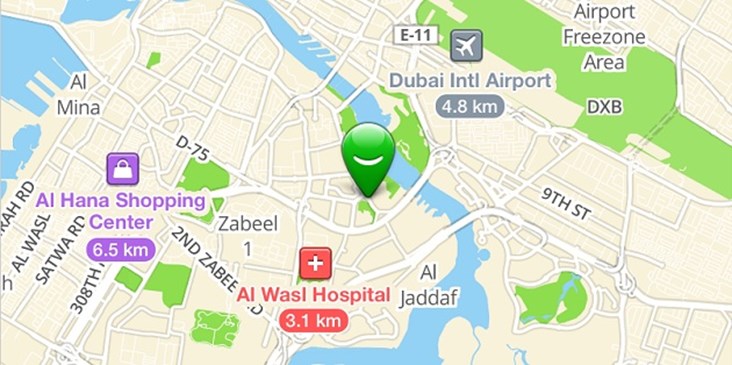
Addy is an online service that simplifies the communication of locations. By transforming coordinates on a map into a unique URL, Addy makes sharing locations extremely easy and more reliable. The company was founded by Khaled Naim, currently the CEO, a Syrian born Computer Engineering graduate who has just completed his MBA at Stanford, along with David Vetrano and Mikel Cármenes Cavia.
The project had been in private beta for almost a year. It launched to the public on Monday, and will very soon be adding more features in the coming week.
How Does It Work?
In its most basic form, Addy wants to help people and businesses share location in a digital, standardized format. After you create an account, you are prompted to create an Addy in a 3-step process. You get a map where you drag and drop a pin to the location for which you want to create a digital address.
After you do that, the next window will give you your info based on where you dropped the pin. You can alter, add, or delete fields. These include the city, the street, the county, the neighborhood, street number, postal code, etc. You get to pick what your URL would be, http://addy.co/your_creation_here, and a name.
In step three you specify the type of the estate; residential, business or other. You can add an email, a phone number, and a website, in addition to notes. That could be the floor you’re on, the room number, or anything of the sort. After you’re done, your Addy is added onto your home page.
The company also plans to launch an embedded map widget next week, which would allow people to embed Addies in their own websites.
Initially, you are allowed to create two Addies. You can get more either by sharing on social networks or by getting the pro version.

The Pro Version
This is where it gets interesting. The pro offers a lot of perks, naturally, but it is also where the Addy team believes business will want to come aboard. First, you’ll get Addies galore: the possibility to create up to 40 Addies with the option of having ones with less than 4 characters, the ability to import or export your Addies in batch using standard file formats, and analytics. The latter would allow pro users to review sites, for example, or to track engagement.
Other than review sites, there is a great number of businesses that can benefit from this service. Shipping companies is one of them. With a simpler, unified system that tells them where to go, neither the company nor customers would need to worry about losing a package. You can also use it to order food. The number of companies that could utilize Addy and applications are really endless.
The local e-commerce scene keeps growing, but there are still hurdles as Khaled remarked. Startups, along with more established companies, have found opportunity in plugging these gaps. PayPal try and tackle payment for example. Addy are doing their bit as well.
Choosing a Platform to Build On
I was curious, so I asked Khaled why they opted not to use Google maps and go with Open Street Maps instead. He admitted that it was the harder route, but that it would prove the better one in the long run. He gave four reasons:
First, Google’s term of services does not allow users to add layers of data. Addy is built on data. They use landmarks to navigate for example. They can’t modify Google maps to better suit their needs.
Second, it is a generic product designed for the masses. It wasn’t built with Addy in mind, or any other service for that matter. Their need was simpler: more minimal maps.
Third, it was about building their own unique brand, and not using other companies’ products is one fundamental condition they should follow to achieve uniqueness.
Finally, it is critical that they own control of the data.
The company, which is based in San Francisco, is accelerated by StartX, where it was chosen as a stand out for its ingenuity, potential and innovativeness. It was also picked as one of the top 5 of StartX’s Summer 2012 Demo Day by TechCrunch.
The service is currently available exclusively on the web. "It's a URL based system; it makes sense to start there," Khaled concluded. But the mobile app is already being designed. Be sure to check it out and claim your Addy.
Latest Business
Intelligence Report














